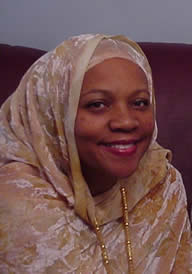NHLBI Office of Research Training and Minority Health celebrates 10th anniversary
Office of the Director - July 31, 2012
 |
The NHLBI Office of Research Training and Minority Health (ORTMH) celebrated its tenth anniversary in July. To mark the occasion, ORTMH held a seminar on July 24 featuring keynote speaker Dr. Fatimah Jackson, director of the Institute of African American Research and professor of biological anthropology at the University of North Carolina, Chapel Hill. Jackson spoke about the importance of knowing the history, culture, racial and ethnic background, and other anthropological perspectives at play in order to truly comprehend and improve minority health and health disparities.
ORTMH provides leadership for the heart, lung, blood, and sleep research training programs across the institute and the NIH. It also serves as the NIH focal point to help ensure greater participation of racial and ethnic populations in research and training programs. In their own words, they are "a small office with a big mission."
When ORTMH was established in 2002, it was given a dual but tightly integrated mission. First, on the minority health and health disparities front, the NHLBI understood the importance of using public funds for the benefit of all. Second, the Institute recognized that without training and career development, there would be no individuals to grow up to become the next generation of successful, independent researchers. Under the coordinated effort of one office, both of these aspects combine in an effort to produce a strong and diverse workforce.
Today, ORTMH is taking part in the President's call to generate 1 million additional graduates in science, technology, engineering, and mathematics (STEM) fields in the next decade. Future efforts include looking at ways to track trainees, follow career paths, and assess outcomes. Among many other activities, the office continues to investigate innovative but effective and cost-efficient methods such as webinars and social media to meet training needs in scientific disciplines with gap areas.
Related link:
Ten notable achievements from ORTMH over its first 10 years:
1. Developed the first online application for the Biomedical Research Training Program for Individuals from Underrepresented Groups (BRTPUG), which increased both NIH IC visibility and applications.
2. Partnered with Cherokee Elementary School, NC, and later Smokey Mountain Elementary School, NC, to initiate Project: Out of the Box, which motivates students to improve their health and physical well-being.
3. As part of the Jackson Heart Study training program, supported an initiative for a group of scholars from Tougaloo College in Jackson, MS, to visit the NIH each year to help them prepare for scientific research careers.
4. Established the first NHLBI Active T32 Training Grants Database, open to all and routinely used by candidates seeking research training opportunities in NHLBI mission areas.
5. Began the NHLBI e-Mentoring Initiative, which provides research mentoring opportunities with NHLBI funded investigators, particularly for individuals in less research-intensive institutions.
6. Formed new mentoring partnerships with the NIH Office of Science Education LifeWorks and the American Society for Hematology to provide assistance for undergraduate students through junior faculty interested in NHLBI-related research careers.
7. Represented the NHLBI on the first Federal Health Disparities Steering Committee that crossed all relevant agencies.
8. Held first Physician-Scientist Trainees workshop in conjunction with the development and release of a new NHLBI F30 program to increase the number of clinically trained investigators conducting research.
9. Established the first NHLBI Health Disparities Research Interest Collaborative as a "think tank" to address diversity-related research, training, and education issues at the agency and across other federal sectors.
10. Each year through oversight of the NIH Research Supplement Program, ORTMH adds approximately 100 new researchers from diverse backgrounds, individuals with disabilities, and those reentering the research workforce to address heart, lung, and blood diseases and conditions.
















